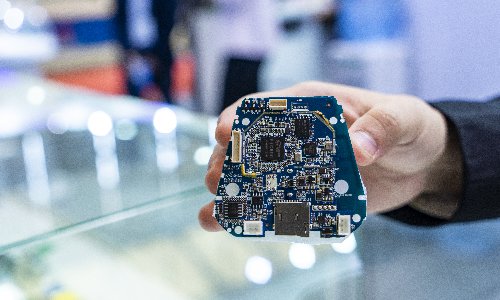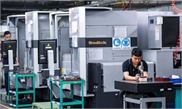SOURCE / INDUSTRIES
Chinese companies aim for chip self-sufficiency

An employee showcases a semiconductor integrated circuit at an industry expo on October 31. Photo: VCG
Many Chinese companies - including chipmakers, smartphone makers and even automakers - have redoubled efforts to build up their semiconductor capabilities in recent months, as the coronavirus assault and an emerging technology battle with the US have shaken global supply chains, prompting domestic players to ramp up production and reduce imports.
"Since March, I have received calls from companies downstream asking if we could supply them," a manager of a 5G smartphone chip manufacturer told the Global Times on Thursday.
The manager said that some of the clients used to source chips from Japan, South Korea and the US, but those imports were delayed by stringent lockdown measures. Others turned to domestic chip suppliers over worries that production at foreign chip factories could be suspended as part of epidemic prevention measures.
Most chip production in China ran as usual during the past months, even at the height of the epidemic, the Global Times learned. A disruption in the overseas supply chain is just one incentive for Chinese chipmakers to bolster their capacity amid the coronavirus outbreak.
Looking inward, Chinese authorities are promoting "new infrastructure" investment such as 5G, artificial intelligence, industrial robotics and the Internet of Things to shore up the virus-hit economy.
"Chips are essential components in high-tech products, so the market for self-developed chips is immense. The sector can also benefit from economies of scale," Ma Jihua, a veteran industry analyst, told the Global Times on Thursday.
China's biggest chipmaker, SMIC, announced in recent days that it plans to list on China's sci-tech board. Some analysts estimated the company could raise $3 billion through the listing.
SMIC said about 40 percent of the proceeds will be used to deepen its capability in 12-inch wafers. Analysts said the fundraising will help SMIC better compete with TSMC. Huawei switched some of its orders to the Shanghai-based company from TSMC in preparation for more US restrictions.
In the first quarter, the sales revenue of HiSilicon, the semiconductor arm of Huawei, grew 54 percent year-on-year to $2.67 billion, making it the first semiconductor company in the Chinese mainland to be ranked in the global top 10 list.
With potential US curbs hanging over them, major Chinese companies are following Huawei's lead in reducing reliance on foreign suppliers of semiconductors.
Chinese new-energy vehicle producer BYD told the Global Times that it inaugurated a 1-billion-yuan ($ 141.03 million) insulated-gate bipolar transistor (IGBT) semiconductor project in Changsha, capital of Central China's Hunan Province in April. The investment is part of BYD's latest effort to make a breakthrough in IGBTs — the core technology of NEVs - which has been monopolized by Japanese and European manufacturers.
Such moves bode well for China's goal of achieving a self-sufficiency rate of 40 percent this year, industry insiders said. China is also on course to produce 70 percent of the semiconductors it uses by 2025.
"Chinese companies have an overwhelming edge in developing chips, thanks to the market size and explosive demand. But we started late. We need to hustle as the divide between China and the US has become an ocean," the manager noted.
Ma urged Chinese players to overcome weaknesses in the whole chip system, such as in the research and development of central processing units and mobile radio frequency identification chips.
The market size of China's integrated circuit industry will hit 900 billion yuan in 2020, compared with 759 billion yuan in 2019, according to a report issued by research institute ASKCI in February.


